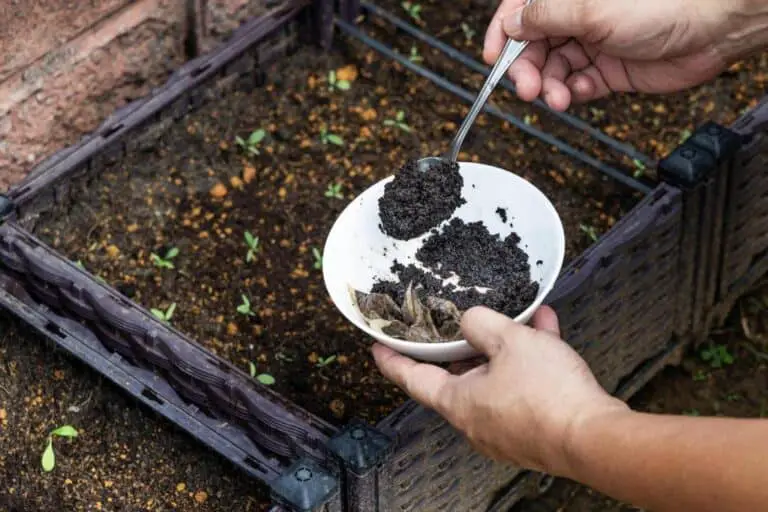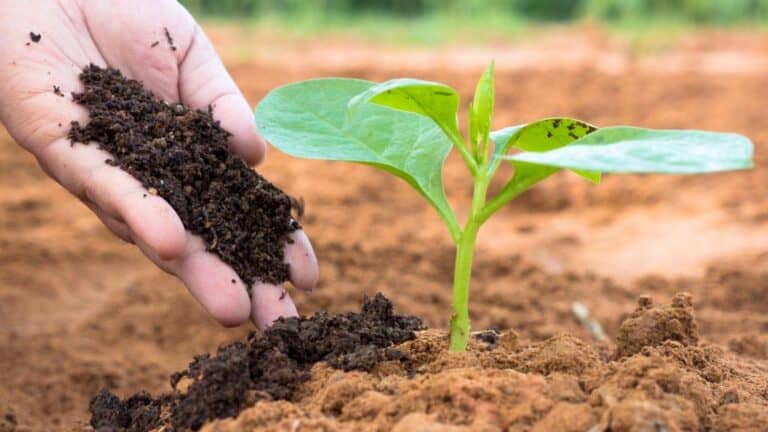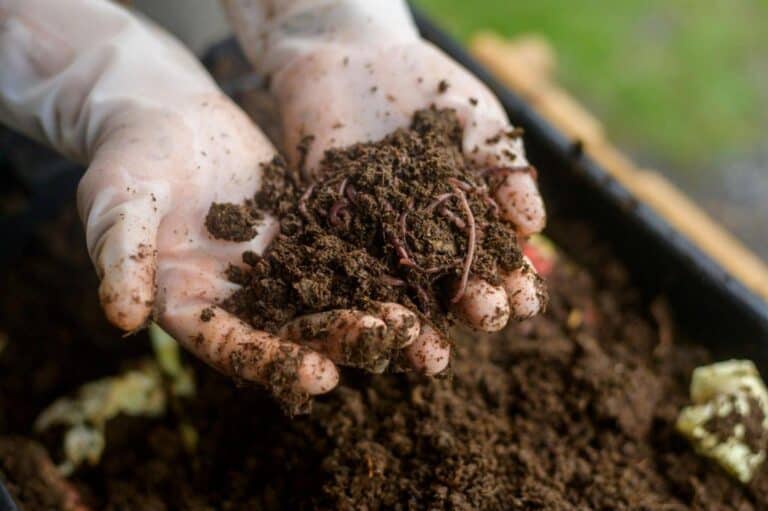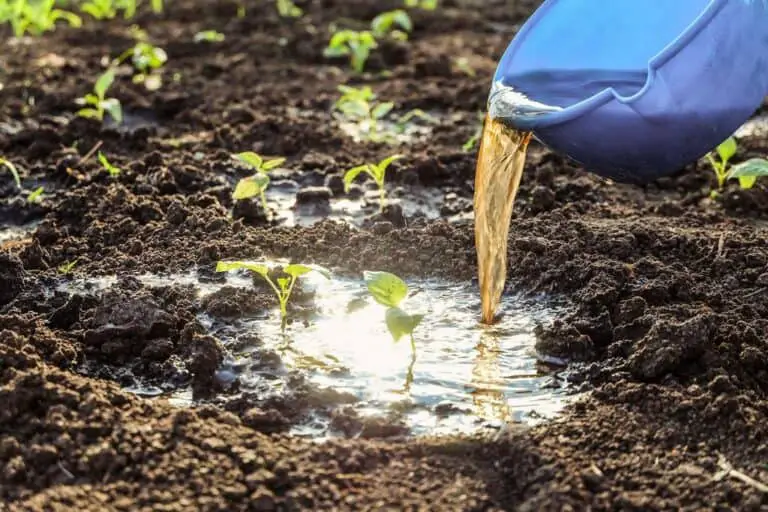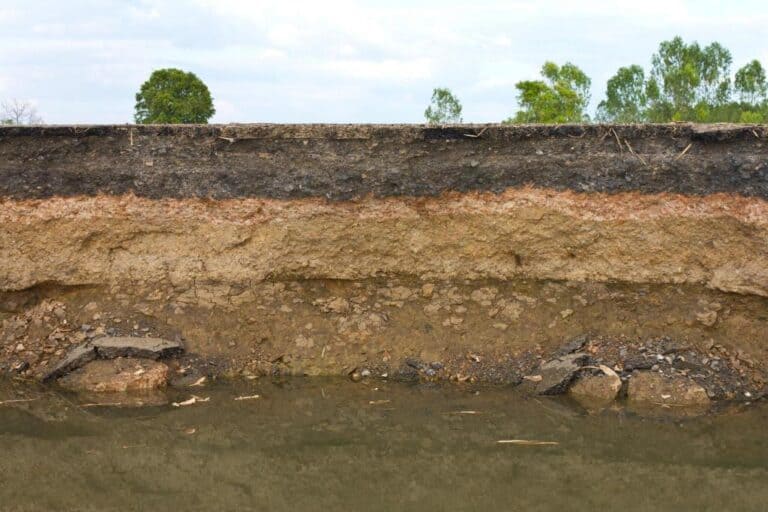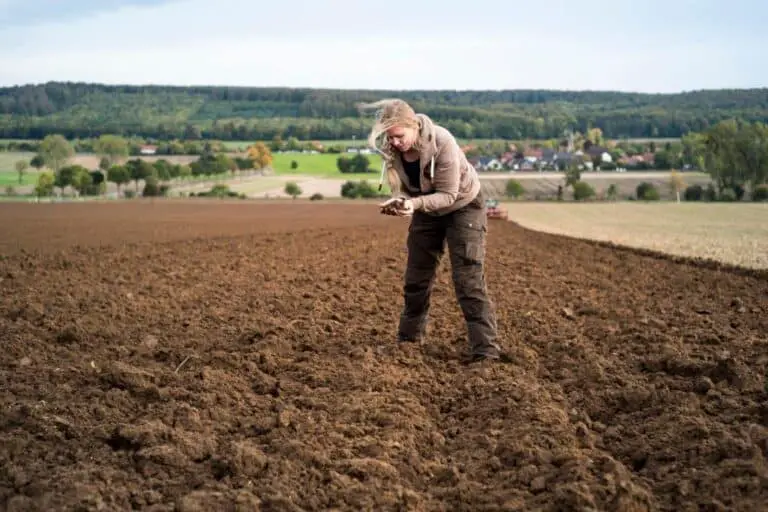Is Composted Horse Manure Good for Tomato Plants? Fertilizing Naturally
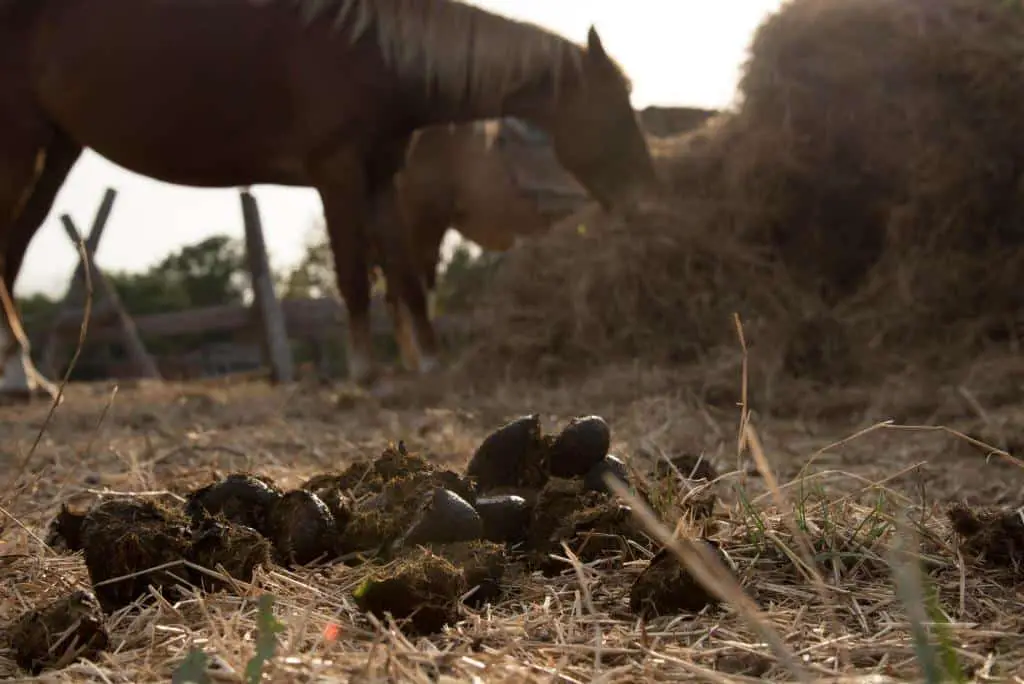
Home gardeners are on a quest to grow their fruits and vegetables free from synthetic chemicals. They seek natural solutions to nurture their plants with care. Yet, as they delve into the world of organic gardening, many face the daunting task of finding effective alternatives to chemical-based fertilizers.
One lesser-known gem in the realm of natural fertilizers is composted horse manure. Yes, you read that right—this humble resource could be just what your tomato plants need for robust growth and bountiful harvests. Composted horse manure provides vital nutrients. Using it also promotes sustainable practices by reducing waste through recycling.
But before we dive into why composted horse manure might be your garden’s secret weapon, let’s spare a moment to consider the potential pitfalls of relying too heavily on chemical fertilizers. These products may offer quick and visible results at first glance. However, long-term use can have negative effects on soil health and ecosystem balance.
If you’re looking for an all-natural alternative that nourishes both your plants and your conscience, stay tuned. We’ll explore how composted horse manure can become your go-to fertilizer for precious tomato plants.
What is Composted Horse Manure?
The term “compost horse manure” refers to the organic material that horses produce after going through a controlled decomposition process known as composting. Composting involves collecting and stacking the manure, along with other organic materials such as straw or wood shavings, in a designated area. It breaks down naturally over time.
Related: Horse Manure and Wood Shavings Compost
The importance of composting lies in its ability to transform raw manure into a nutrient-rich soil amendment. During the composting process, bacteria and microorganisms break down the manure. They convert it into humus, a dark and crumbly substance that is ideal for improving soil fertility. This decomposition also helps eliminate any potential pathogens or weed seeds present in fresh horse manure.
Is Composted Horse Manure Good for Tomato Plants?
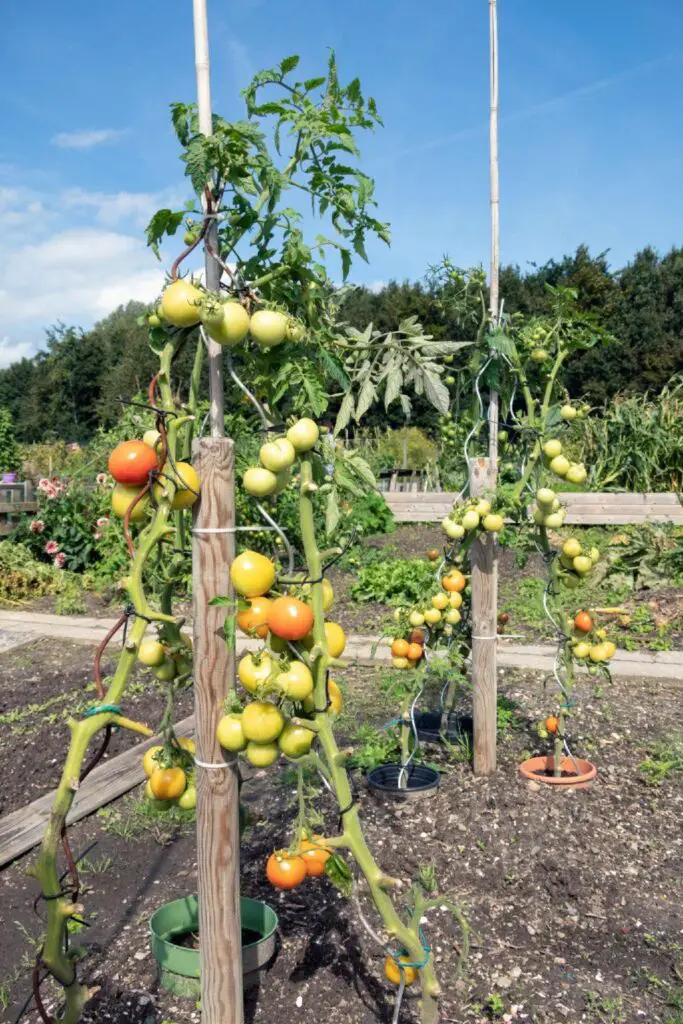
Composted horse manure is good for tomato plants. Horse manure is more mild than other manures. It provides more nutrients and has a softer texture, which makes it easier to dig into the soil.
When properly composted, horse manure becomes an excellent source of nutrients for plants. Additionally, it provides secondary macronutrients such as calcium (Ca), magnesium (Mg), and sulfur (S). It also includes important micronutrients like iron (Fe) and zinc (Zn).
Composted horse manure nourishes plants. It also adds organic matter to the soil, improving its structure and water-holding capacity. Furthermore, this natural fertilizer promotes beneficial microbial activity in the soil ecosystem. This enhances overall plant health and vigor.
In addition to its nutrient content, horse manure aids in moisture regulation in the soil. It prevents soil from drying out too quickly. This is particularly advantageous during hot summer months when tomatoes require consistent hydration. Furthermore, the composting process reduces the likelihood of weed seeds and pathogens, minimizing competition for resources and the risk of plant diseases.
However, it is important that you never plant tomatoes directly into manure. Manure alone lacks the required minerals for your plants and may cause fertilizer burns.
Fresh manure should not be used in gardens because it can burn your plants. Aged horse manure that has been allowed to dry over the winter can be used, but the preferred method is to compost the horse manure.
| Read: Staking Tomato Plants: Tips and Tricks |
Benefits of Using Composted Horse Manure on Tomato Plants
Composted horse manure offers several advantages when it comes to fertilizing tomato plants in an organic garden. First and foremost, it is a natural and sustainable option that aligns with the principles of organic gardening. By using composted horse manure, you avoid the harmful effects of synthetic fertilizers. Synthetic fertilizers can cause environmental pollution and disrupt soil quality over time.
1. Increased soil fertility
One of the main benefits of using composted horse manure as a fertilizer for tomato plants is its ability to increase soil fertility. Horse manure contains essential nutrients like nitrogen, phosphorus, and potassium. These nutrients are vital for plant growth. When properly composted, these nutrients become readily available to the tomatoes. This promotes healthy foliage development and fruit production.
2. Enhances microbial activity in soil
Composted horse manure provides an excellent source of organic matter. It feeds beneficial microorganisms in the soil. These microorganisms transform complex organic compounds into simpler forms.
The simpler forms are easy for plants to absorb. This enhanced microbial activity helps with nutrient cycling. It also improves the overall health of the soil and reduces the risk of disease.
3. Improves soil structure
The addition of composted horse manure to tomato beds can significantly improve soil structure. It helps sandy soils retain moisture. It prevents clayey soils from becoming compacted by increasing their porosity. Improved soil structure allows roots to penetrate deeply, access nutrients more efficiently, and enhance water infiltration and drainage.
4. Organic matter enrichment
Organic matter plays a crucial role in maintaining long-term soil fertility. Composted horse manure adds valuable organic matter to garden beds, improving water-holding capacity while reducing erosion risks. This gradual breakdown releases nutrients slowly over time, providing a sustainable food supply for your tomato plants throughout their growing season.
| Also see: How to Compost Horse Manure Quickly |
How to Properly Use Composted Horse Manure on Tomato Plants
When it comes to using composted horse manure as a natural fertilizer for tomato plants, there are a few key considerations to keep in mind to ensure optimal results.
First and foremost, the quantity of composted horse manure you use is important. It’s generally recommended to dilute the composted manure with other organic materials, such as straw or wood chips, at a ratio of 1:2 or even 1:3. This helps prevent nutrient imbalances and excessive nitrogen levels that could potentially harm your tomato plants.
In terms of application timing, you have two options: pre-planting or top dressing during the growing season. Mix the diluted composted manure into the soil before transplanting your tomatoes for pre-planting applications. This allows time for beneficial microbes in the soil to break down nutrients and make them readily available to your plants.
If you opt for top dressing during the growing season, gently spread a thin layer (about an inch) of diluted composted horse manure around each plant. Avoid direct contact with stems or leaves. Then water thoroughly to help nutrients leach into the root zone without causing burning.
Before applying composted horse manure, proper soil preparation is essential. Make sure your garden bed has good drainage. Work in organic matter like aged leaf mulch or well-decomposed compost before planting. This helps create a loose and fertile environment. It encourages root development and enhances nutrient uptake from fertilizers.
For application rates, moderation is key. Apply composted horse manure in the early stages of tomato growth, avoiding direct contact with the plant stems. A layer of 1 to 2 inches around the base is generally sufficient. Spring is an ideal time for application, allowing the compost to integrate into the soil before the heavy growing season. Consider top-dressing in the fall to nourish the soil during the winter months.
| Related: Can You Plant Directly Into Well-Rotted Manure? |
Tips for Successful Tomato Gardening with Composted Horse Manure
Regular Monitoring:
- Keep a watchful eye on your tomato plants. If you notice any adverse reactions, adjust the quantity of composted horse manure accordingly.
Mulching:
- Complement the benefits of composted horse manure by adding a layer of organic mulch on top of it. This conserves moisture, suppresses weeds, and further enriches the soil over time.
Companion Planting:
- Pairing tomatoes with compatible plants can enhance their growth. Consider companion plants like basil, marigolds, or nasturtiums. They will create a harmonious
Considerations and Possible Drawbacks of Composted Horse Manure
There are quality control concerns. Another aspect to consider is quality control when using organic material as fertilizer. When using composted horse manure, make sure it has decomposed and aged properly before applying it to your tomato plants.
Fresh horse manure contains harmful pathogens and weed seeds. They could harm your plants instead of enhancing their growth. By properly composting the manure at temperatures above 140°F (60°C) for several months, these potential risks can be mitigated.
Consider availability, quality control, and potential nutrient balance risks. This will help you decide if using composted horse manure as a natural fertilizer for your tomato plants is right for you.
It’s crucial to be aware of potential risks when using any type of animal-based fertilizer, like horse manure. One concern is residual herbicides used on horses’ feed or bedding. These herbicides can pass through their waste onto crops like tomatoes. To mitigate this risk, get information about the source of your horse-manured compost. Ensure it doesn’t come from animals fed on hay treated with persistent herbicides.
Alternatively, you can perform a simple test by planting some indicator plants (like beans or peas) in soil mixed with the composted horse manure. Assess any herbicide damage before using it on your tomato plants.
| Read: Can I Use Aged Dry Horse Manure in My Garden? |
Common Concerns and Solutions
1. Availability
Not everyone has access to horses or farms where they can obtain composted horse manure. Urban gardeners and people without nearby equestrian facilities can find it challenging to find a reliable source. Contacting local farmers or stables that may be willing to provide their composted horse manure for free or at a minimal cost.
2. Weed Seeds
When using composted horse manure, make sure it has decomposed and aged properly before applying it to your tomato plants. Fresh horse manure contains weed seeds that could harm your plants rather than enhance their growth. By properly composting the manure at temperatures above 140°F (60°C) for several months, these potential risks can be mitigated.
3. Nutrient Imbalance
Composted horse manure provides an array of nutrients essential for plant growth, including nitrogen (N), phosphorus (P), and potassium (K). However, it can cause nutrient imbalance if used carelessly. Organic materials release nutrients slowly over time. Synthetic fertilizers have readily available nutrients.
4. Over-fertilization
It’s crucial not to overapply the compost. Excessive amounts could lead to nutrient imbalances. This could adversely affect tomato plant health and productivity. Agricultural extension offices regularly test the soil. This can help determine the nutrient levels in your garden soil. It can also guide you on appropriate application rates based on specific needs.
5. Odor Issues
Well-composted horse manure should have a mild, earthy smell. If it’s overly pungent, additional curing or composting may be necessary before application.
6. Pathogen Risks
High-temperature composting effectively eliminates pathogens. Still, it’s advisable to use composted horse manure from trusted sources to mitigate any potential risks. Fresh horse manure has pathogens and weed seeds that are bad for plants and could stop them from growing. It is possible to lower these risks by properly composting the manure at temperatures above 140°F (60°C) for a few months.
Comparing Composted Horse Manure with Synthetic Fertilizers for Tomato Plants:
Environmental impact:
Composted horse manure is a natural fertilizer for tomato plants. It has a positive environmental impact. Unlike synthetic fertilizers, which often contain harmful chemicals that can leach into groundwater and pollute nearby water sources, horse manure provides organic matter. It enriches the soil without causing harm to the
Additionally, by using composted horse manure instead of synthetic alternatives, you are reducing your carbon footprint since it helps recycle waste materials.
Cost-effectiveness
Another aspect worth considering when comparing composted horse manure with synthetic fertilizers is cost-effectiveness. Synthetic fertilizers can be expensive and require regular purchases to maintain optimal plant growth. Composted horse manure offers a more affordable alternative.
If you have access to horses or know someone who does, obtaining their waste products could potentially save you money in the long run. They provide a readily available source of nutrients for your tomato plants.
Long-term soil health benefits
Composted horse manure use also brings long-term soil health benefits. It surpasses relying only on synthetic fertilizers. Natural animal-based amendments like these add essential organic matter back into the soil. They also feed beneficial microorganisms present in healthy ecosystems. Over time, this process improves overall fertility and structure. It also enhances moisture retention capabilities and nutrient availability for your tomato plants.
Additional Organic Fertilizer Options for Tomato Plants
Composted horse manure can be an excellent natural fertilizer for tomato plants. However, it’s important to explore other options too. One alternative worth considering is worm castings, also known as vermicompost.
Worm castings are rich in nutrients and beneficial microorganisms, making them an ideal choice for organic gardening. They improve soil structure, increase water retention, and enhance overall plant health.
Another organic fertilizer option is fish emulsion. This liquid concentrate is derived from decomposed fish waste and contains a balanced mix of essential nutrients like nitrogen, phosphorus, and potassium. Fish emulsion provides a quick boost of nutrition to tomato plants and promotes vigorous growth. It can be applied directly to the soil or diluted with water for foliar applications.
By diversifying your organic fertilization methods with alternatives like worm castings or fish emulsion alongside composted horse manure, you give your tomato plants access to a wider range of nutrients. This is necessary for their optimal growth and fruit production.
Experimenting with different types of fertilizers can enrich your garden soil. It also allows you to find the best approach that suits your specific needs. This promotes sustainability in gardening practices.
In Conclusion
In the quest for vibrant, flavorful tomatoes, the choice to use composted horse manure emerges as a natural and sustainable option. The nutrient-rich composition, organic origins, and positive impact on soil structure stand as a testament to the potential of natural fertilizers.
So, is composted horse manure good for tomato plants? When you integrate this natural fertilizer into your gardening routine, you nurture your tomatoes. You also contribute to a healthier, more sustainable gardening ecosystem. Embrace the power of composted horse manure and watch your tomato garden flourish in the most delightful way.

